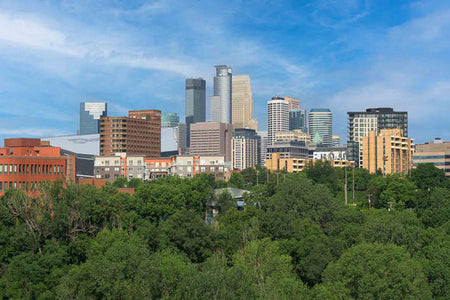- Tree pollen peaks in spring, grass pollen is worst in early summer, and weed pollen dominates late summer and fall, with allergies being most intense in Virginia from April to June.
- Stay informed by monitoring pollen counts in Virginia, use HEPA filters, keep windows closed, and consider wearing a pollen mask to reduce exposure to allergens.
- Allergy medications can manage multiple symptoms and should be used at the start of symptoms or before allergy season in Virginia.
Virginia’s natural beauty, from the Blue Ridge Mountains to the Atlantic coast, comes with a downside for allergy sufferers: a long pollen season. The state’s mix of forests, meadows, and different climates makes it a great place for plants to grow — and for pollen to spread.
Tree, grass, and weed pollen are common throughout the year. By understanding when and where allergies are worst in Virginia, you can better plan and manage your symptoms.
When is Pollen Season in Virginia?
Pollen season in Virginia generally runs from late February to November with different allergens peaking at different times.
Trees start to release pollen from late February through June. The peak months for tree pollen are usually April and May when various tree species like oak, pine, and birch are most active. Grass pollen is most active between May and early July. This is when grasses such as Bermuda and Kentucky bluegrass release their pollen [*]. By mid-summer, pollen levels drop as trees and grasses finish pollinating.
However, late August marks the start of weed pollen season, which lasts until the first frost. Ragweed is the main cause of allergies during this time.
Knowing these patterns can help you plan and manage allergy symptoms more easily.
Related: The 5 Best and Worst States for Pollen Count
What are the Worst Months for Allergies in Virginia?
April, May, and June are the worst months for allergies in Virginia because pollen counts are at their highest during this time.
- Spring (March to May): Spring is the worst season for allergies in Virginia. Tree pollen peaks during this time, and grass pollen starts to rise, triggering strong allergy symptoms like sneezing, runny nose, and itchy eyes.
- Early Summer (June): Grass pollen reaches its highest levels in early summer. This keeps allergies active, even as tree pollen begins to decrease. Bermuda grass pollen levels can be particularly high during this time [*].
- Late Summer to Fall (August to November): Weed pollen dominates during late summer and fall, which makes allergy symptoms persist until the first frost ends the weed pollen season.
When Does Pollen Season End in Virginia?
Pollen season in Virginia typically ends in November, although it can last into the fall depending on weather conditions. Tree pollen season usually ends in June, while grass pollen season tends to wind down by early July. Weed pollen season can extend into the fall and can persist until the first frost.
The first frost marks the end of pollen season for most allergens. Frost kills or slows down plants that produce pollen, so there’s less pollen in the air after this point [*].
Related: 10 Worst Cities for Seasonal Allergies
Common Allergens in Virginia
Common allergens in Virginia include tree, grass, and weed pollen. In addition to pollen, indoor allergens like dust mites, pet dander, and mold can cause allergy symptoms year-round.
Common tree pollen in the spring includes :
- Oak
- Pine
- Cedar
- Maple
- Birch
Grass pollen in the early summer include:
- Bermuda
- Redtop
- Johnson
- Kentucky bluegrass
- Orchard
Weeds in late summer to fall include:
- Ragweed
- Thistle
- Goldenrod
Other allergens (found indoors):
How to Prepare for Seasonal Allergies in Virginia
Seasonal allergies in Virginia can be tough, but you can take steps to manage your symptoms. Here are some simple tips to help:
- Monitor pollen counts: Check daily pollen levels to plan outdoor activities when levels are lower. You can use weather websites, apps, or allergy forecast tools.
- Stay indoors during high pollen periods: Avoid going outside when pollen counts are at their highest, especially in the morning. This is likely why you might feel congested or experience other allergy symptoms if you go outside during this time.
- Keep windows closed: Shut windows to stop pollen from entering your home. This is especially important on windy days when pollen can travel more easily through the air and settle on surfaces.
- Use HEPA filters: Add HEPA filters to your home to remove allergens from the air. These filters are designed to capture at least 99.97% of airborne particles that are 0.3 microns in size or larger, which includes common allergens such as dust, pollen, mold spores, and pet dander [*].
- Clean regularly: Dust and vacuum often to reduce pollen and other allergens in your home. You can do this at least once or twice a week. However, if you have severe allergies or live in a high-pollen area, you may want to clean more frequently.
- Shower and change clothes: Wash off pollen after being outside and put on fresh clothes.
- Wear a pollen mask: Use a mask when going outdoors to block allergens. Research shows that wearing a mask reduces nasal and ocular discomfort during pollen exposure [*].
- Consider taking allergy medications: Use over-the-counter or prescribed medications to ease your symptoms. A combination nasal spray, like Allermi, is beneficial because it treats several allergy symptoms like stuffy nose, runny nose, and swelling. Allermi combines an antihistamine, decongestant, and corticosteroid at customized doses, all in one bottle, for personalized optimal relief. It’s a good idea to start using Allermi as soon as your symptoms start or a few days before the anticipated allergy season.
The Bottom Line
Remember, tree pollen peaks in spring, grass pollen dominates in early summer, and weed pollen becomes the main culprit in late summer and fall until the first frost. Don’t let seasonal allergies in Virginia keep you indoors — equip yourself with the tools to breathe easier and embrace the outdoors!
References:
- Grass pollen Allergy | AAFA.org. (2025, January 14). Asthma & Allergy Foundation of America. https://aafa.org/allergies/types-of-allergies/pollen-allergy/grass-pollen-allergy/
- Liao, C., Liang, C., Hu, H., Luo, W., Wu, G., Huang, Z., Wu, L., & Sun, B. (2020). Major Pollen Allergen Components and CCD Detection in Bermuda Grass Sensitized Patients in Guangzhou, China. Journal of Asthma and Allergy, 13, 615. https://doi.org/10.2147/JAA.S277704
- Grinspoon, P., MD. (2022a, March 28). Save the trees, prevent the sneeze. Harvard Health. https://www.health.harvard.edu/blog/save-the-trees-prevent-the-sneeze-2019091017666
- What is a HEPA filter? | US EPA. (2024b, September 4). US EPA. https://www.epa.gov/indoor-air-quality-iaq/what-hepa-filter
- Bergmann, C., Kugler, S., Zuberbier, T., & Becker, S. (2021). Face masks suitable for preventing COVID-19 and pollen allergy. A study in the exposure chamber. Allergo Journal International, 30(5), 176. https://doi.org/10.1007/s40629-021-00180-8









